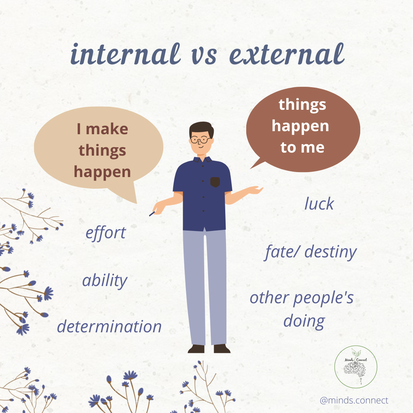If you believe that you have no control over what happens and that external factors are to blame, then you have what is known as an external locus of control. As we see in this post, your locus of control can influence the way you respond to events by attributing causality, and also impact your motivation to take action. If you believe you can do "something about it" then it is more likely you will take action and feel empowered instead of hopeless. Attribution example:
Positive self-esteem is a factor that may play an important role when the attribution is internal. Success attributed to an internal cause (the person) is a source of pride. Success attributed to ability and/or effort is a source of pride because both ability and effort are internal attributions, and feel controllable. Failure attributed to an internal cause is a source of disappointment, and it may mobilize the person to do "something about it", to better themselves. Internal attributions both for success and failure are felt as controllable and the person believes there is something they can do about it. Internal locus of control is often used synonymously with "self-determination" and "personal agency." Internal locus of control looks like:
External attributions of success and failure are perceived as out of the person's control. Therefore, there is a more passive attitude towards it that can impact negatively the self-esteem of the individual. When success or failure happens it is perceived as if it is because of luck / fate / other people's doing and it feels as not controllable. Successes that are attributed to external causes will not help the development of a sense of pride in the person as it is not perceived as effort/ ability. Failures attributed to external factors will create a sense of hopelessness with the feeling that "there is nothing to do to change it". External locus of control looks like:
Fray, and Owens (1973) measured peoples locus of control using Rotter's locus of control test and then had participants perform an experiment around a vigilance task. Participants with higher internal locus of control performed significantly better on the task than those with high external locus of control; showing that people with internal locus of control have significantly better attention and alertness, qualities that improve performance on countless tasks people have to perform throughout life (Sanders et al. 1973). However, it is also important to note that internal locus of control does not always mean "good" and external locus of control does not always mean "bad." In some situations, having an external locus of control can be a good thing, for example when a situation may harm your self-esteem or is genuinely outside of a person's control. So, it will really depend on the circumstances and what seems best for that person at that given time in order to be able to move on and feel in control of their own life. Am I what happened to me? Or am I what I choose to become? Our personal story does not need to determine the narrative of OUR life story. Our personal story is a compound of events, reactions, actions, and associated feelings, emotions, desires, and passions. Challenges, difficulties, traumas, failures, positive experiences, successes, love and break-ups. We can make a coherent narrative of our life story by considering our early experiences, the beliefs developed after these events, the sense of control, the protective nature of our actions lead by our nervous system and our faith in personal resilience. In therapy, we explore all of this, giving meaning to the story of your life in order to develop a sense of agency and self-efficacy, to become the person you want to become despite the difficulties of what happened to you. It may be a long journey but could be one of the best journeys we can embark on. Please leave your comments below. You can also find more in this Instagram post.
0 Comments
Leave a Reply. |
AuthorHi there! Archives
January 2022
Categories |

 RSS Feed
RSS Feed
